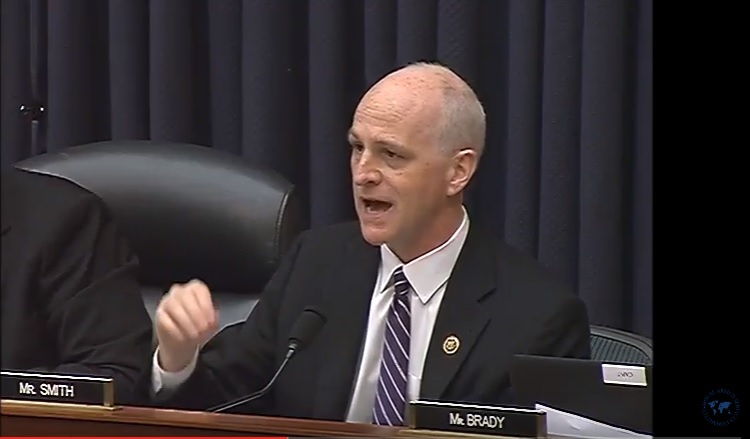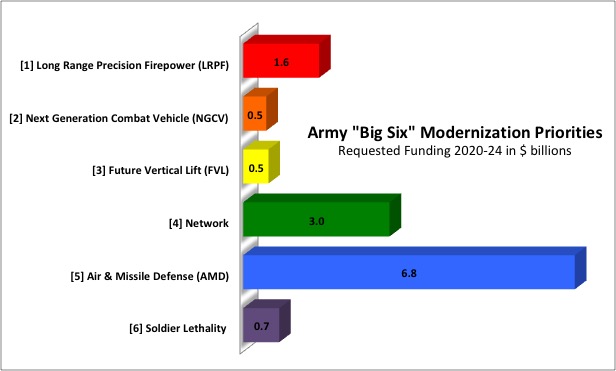Adam Smith: Doubts $750B Budget, Praises Army, Downplays Yemen War Powers Bill
Posted on
WASHINGTON: The presumptive House Armed Services chairman, Adam Smith outlined his agenda for reporters this morning in a wide-ranging discussion laced with his trademark tactical snark. While many of his stances were unsurprising — he wants equal treatment for transgender troops, less spending on new nuclear ICBMs, and zero border-wall funding carved out of the defense budget — Smith also hit some nuanced notes we haven’t heard before.
On the defense budget, Smith is clearly impressed by the Army’s plan to move at least $25 billion (over five years) from lower-priority programs to its Big Six modernization priorities. At least three times in 76 minutes, he cited the Army’s self-discipline as a model for the rest of the military and an alternative to simply clamoring for more money. That said, he also elided the facts that the move will be spread over five years and that the Army didn’t actually call the cut programs completely unnecessary, just less important than the Big Six. (The six are long-range precision firepower, armored vehicles, aircraft, wireless networks, anti-aircraft/missile defense, and soldier equipment).
On foreign policy, Smith acknowledged that Rep. Ro Khanna’s resolution to invoke the War Powers Resolution to limit US operations in Yemen is not only unlikely to pass over (although the Senate counterpart probably will) against opposition from GOP leaders, who control the House until new members are sworn in this January: Even if it did pass and survive a veto, Smith said, President Trump’s powers as commander-in-chief would let him bypass it easily. The goal of the Yemen debate, he said candidly, is not to impose legal restrictions but to shift public opinion — and it’s succeeding. Along with outrage over the murder of Adnan Kashoggi, the political pressure has already caused the administration to stop refueling Saudi warplanes accused of killing civilians in indiscriminate airstrikes.
It’s worth quoting Smith at some length because he’s an unusually articulate and well-informed legislator. He’s also unusually funny, with a dark sense of the absurd, even when he knows it might come back and bite him.
“I’m sorry,” Smith said at one point, before allowing himself a long sigh. “I have to have a sense of humor in order to get through this job. I understand the serious of it, I understand that people are dying, I understand how difficult it is, but if you don’t have a sense of humor about it, it’s really hard to get through the day.”
Budget: Go Army?
Smith is predictably skeptical about President Trump’s latest proposal for a $750 billion national security budget in 2020 — both the need for that amount and the president’s commitment to it. After all, Trump said $750 billion a month after pledging to cut defense to $700 billion, a month in which Defense Secretary Jim Mattis and other high officials, in ill-concealed revolt, had kept insisting on the president’s initial figure of $733 billion.
“The Department of Defense is being a little bit disingenuous,” Smith said. “Someone testified the other day that anything below $733 billion would increase our risk. Okay, great — well, anything below a trillion will increase our risk…. What’s the magic of 733? Can you explain that to me? I’ve asked that question of several Pentagon officials. Thus far I haven’t been satisfied with the answer.”
But, Smith went on, “the Army just went through their programs and found about $30 billion dollars. Does that mean now that anything below $703 is what increases risk?”
Smith’s math is slightly suspect here. The Army’s moving the $25 to $31 billion (depending on which report you trust) over five years, which means it would only cut about $5-6 billion off the 2020 budget — if the Army were proposing to give up the funds outright, which it isn’t: It wants to move the money to higher priorities.
But Smith’s larger point is valid. There are plenty of programs and projects in the Pentagon budget that were born in very different times, before Russia’s seizure of Crimea, China’s island land grabs, and both countries’ relentless hacking changed the world with what Defense Secretary Jim Mattis has called “the reemergence of long-term, strategic competition.” Before we pile on additional dollars for new priorities, wouldn’t it make sense to carefully cull the old ones?
“I’ve got the Army telling me that when they decided to take a look at where they were spending their money — gee, what a novel idea! — they found $31 billion that they didn’t need to be spending,” Smith said. “They have like 550 programs — which of these programs make sense for today and which don’t, as we transition into cyber warfare and information warfare and higher tech and unmanned vehicles? What does it make sense to get rid of? And they were actually able to find somewhere, I forget the number, between $25 to $31 billion in programs that they didn’t think they needed anymore.” (Again, to precise, the Army said they needed them less than the Big Six, rather than not at all).
Smith’s unsolicited praise for the Army — none of the reporters at this morning’s Defense Writers’ Group actually asked about the Army in particular — is the latest positive sign for that service. Last month, when President Trump was still insisting on cutting defense to $700 billion rather than increasing it to $750, Deputy Defense Secretary Patrick Shanahan said that space, cyber, and Army modernization would be the three priority items to protect from cuts. That’s a surprising trio, considering that the Army is traditionally the least sexy service, lacking jet planes and big ships. No wonder Army Secretary Mark Esper has been sounding so confident of late.
Yemen: War Powers Problems
Transnational terrorism is definitely a threat, and Iran in particular is “malign” and “destabilizing,” Smith said, “no question.” But he doesn’t see a link from those widely acknowledged truths to the Trump Administration’s support of Saudi Arabia’s often-brutal “proxy war” against Iranian-backed Houthis in Yemen.
“Why have we tripled bombings in Yemen since the Trump administration came in and had a corresponding increase in civilian casualties?” Smith asked. Then there are the Saudis’ own actions, he continued: “You’re talking about the closing of ports, the cutting off of aid and food, a relentless bombing campaign, and the civilian devastation that’s resulted from that is largest humanitarian crisis in the world — and what we are getting from that? How does this fit into our strategy to contain transnational terrorism, to contain Iran?”
That said, “the War Powers resolution thing….,” Smith began, then groaned. “There’s no way in the world you can write these stories that’s going to come out in a way that’s positive for me, but I’ll say it anyway: The War Powers resolution is only so useful.”
Even if the resolution passes the Senate (probable — the editors) and the House (improbable), Smith said, and President Trump either doesn’t veto it (possible…) or he vetoes but is overridden (nope), and the administration complies by issuing the legally required report to Congress that military operations are underway…. then what?
“At the end of the day, the President — going back to Thomas Jefferson — has always been able to do with the military what they’ve wanted to do with the military until Congress completely cuts off the money. That’s the only way Vietnam ultimately stopped,” Smith said. “That’s going to be difficult to get past the president, for one thing (i.e. the veto), and for another thing, we’ve got the transnational terrorist threat, which is a legitimate concern… I’ve worked with Ro Khanna, and even in his resolution, he makes it very clear he’s not stopping us from confronting al-Qaeda and other terrorist groups within Yemen.”
Yes, the War Powers Resolution “requires that U.S. forces be withdrawn from hostilities within 60 days of the time a report is submitted or is required to be submitted,” to quote the Library of Congress’s summary. But that’s largely a dead letter.
“There is no greater example of this, to show my bipartisanship, than Libya,” Smith said. That’s where the Obama Administration complied with the War Powers Resolution by officially declaring that “hostilities have ceased” — and then kept bombing anyway. “Hostilities,” apparently, are in the eye of the beholder.
“Now, here is the part I’m sure won’t show up in the stories,” Smith continued: “It is nonetheless important to do what Ro Khanna is doing and what Bernie Sanders is doing because it raises awareness and attention to the problem and the question of what we ought to be doing in Yemen.”
“It’s not so much that the War Powers Resolution is going to make the administration go, ‘oh, shit, well we really wanted to do this, but since you hit us with this, we won’t,'” Smith said. “It’s that it will put public pressure on them to change what they are doing — and we’ve already seen they’ve stopped the refueling.”
Subscribe to our newsletter
Promotions, new products and sales. Directly to your inbox.



